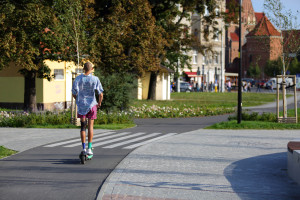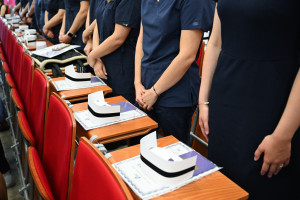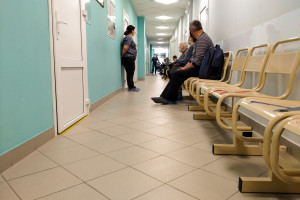Is COVID-19 returning in Poland? "We don't know much because there's no formal reporting"

On Thursday, the hospital in Włodawa introduced restrictions on patient visits to one of the wards due to an increase in Covid-19 cases among staff.
We asked Dr. Tomasz Dzieciątkowski , MD, PhD, virologist, microbiologist, laboratory diagnostician from the Department of Medical Microbiology at the Medical University of Warsaw, whether we can currently speak of an increase in Covid-19 cases or forecast such a scenario for the fall.
As the expert admits, "from the point of view of the entire country, we don't know." - We don't know because there is no formal reporting, no such data, and therefore it is difficult to state it unequivocally.
According to Dr. Dzieciątkowski, it is also difficult to predict what the situation will be like in the fall.
"Here again I can say: we don't know. Besides, this applies to the entire world," he emphasizes, explaining that this is due to a lack of reporting.
"We have various fragmentary reports about increased cases in certain areas. However, there is no formal reporting," he admits.
As he points out, such epidemiological reports stopped being commissioned in Poland about a year and a half ago. "Therefore, it's difficult to say definitively what the situation is like here," he says.
Wave virus, not seasonalWhen asked whether such an increase can be expected in the fall, he is also cautious about such forecasts and emphasizes that, contrary to information often circulating in public opinion, SARS-CoV-2 is not a seasonal virus.
- It is a wave virus - he says, reminding that the increased frequency of infections is most often associated with the appearance of a new variant, and it is not always linked to the seasons.
He admits that infections often spiked during the fall and winter months, but explains that this is more likely due to the fact that, in our latitude, we all have slightly weakened immunity and are more susceptible to infections from all respiratory pathogens. "These will include all cold viruses. Therefore, SARS-CoV-2 as well," the expert points out.
He reminds us that, looking at the epidemic and the situation from a few years ago, serious waves may occur, for example, in the summer.
When asked about the currently dominant variants, he explains that these are different varieties of omicron that differ little from each other.
Dr. Tomasz Dzieciątkowski, referring to the case of the hospital in Włodawa, also reminds that limiting visits is one of the possible actions when an increased number of cases of a given pathogen is detected in a given area, compared to the previous period.
He says that any such significant increase should draw attention and may be a reason to make decisions to limit the spread of infections.
He adds that if a healthcare facility detects an increased incidence of SARS-CoV-2 infections on its premises, then, in accordance with applicable epidemiological regulations, it may introduce, for example, restrictions on patient visits .
"These are standard epidemiological procedures at this point," he says, reminding the audience that masks remain an effective way to limit droplet transmission. "And this applies not only to SARS-CoV-2, but also to flu, for example," he adds.
Copyrighted material - reprint rules are specified in the regulations .
rynekzdrowia










